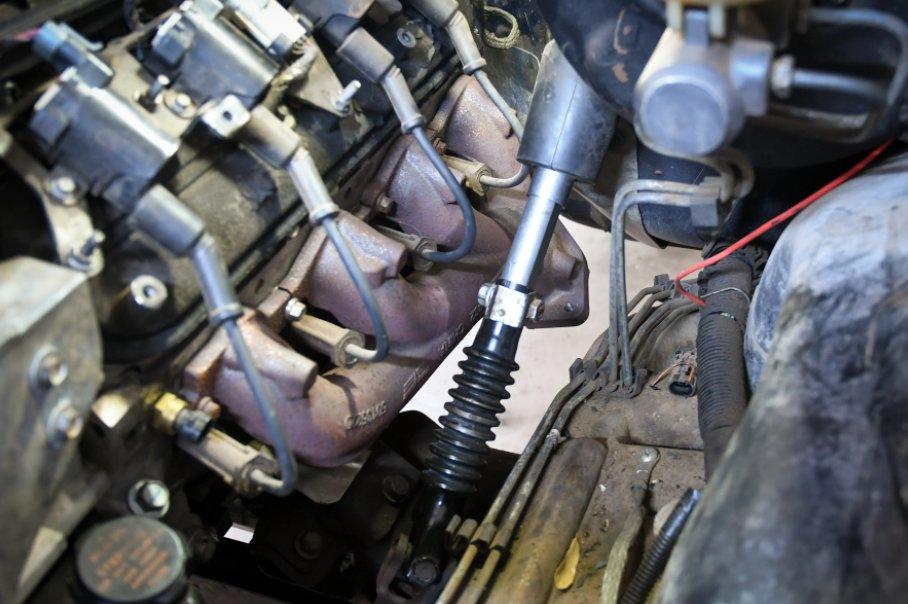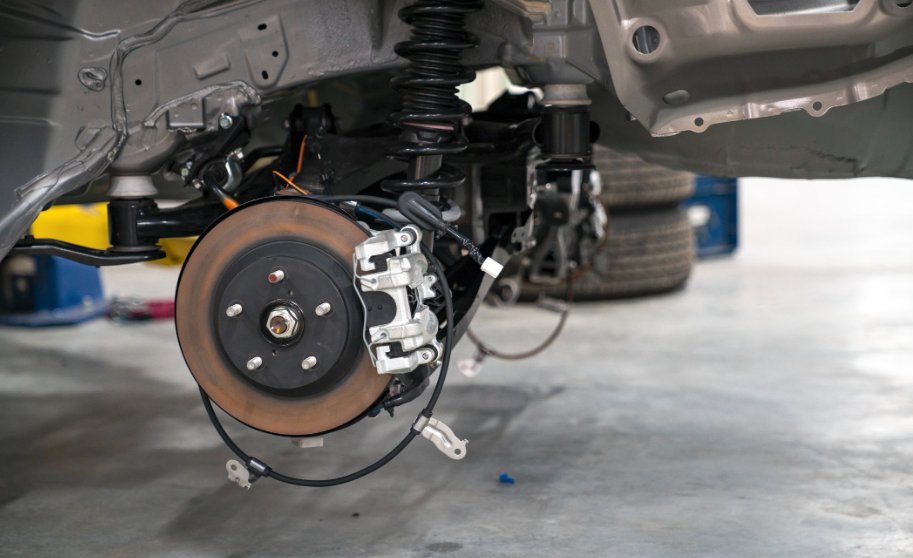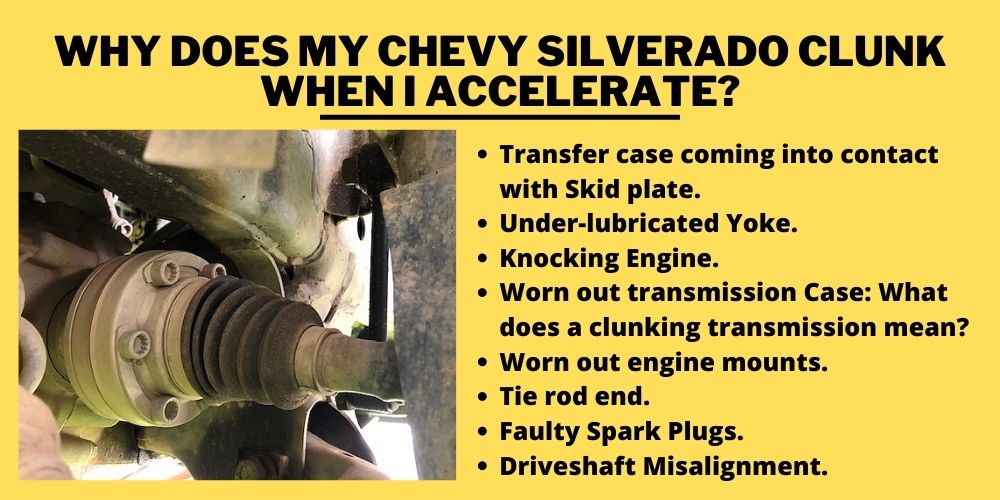It might be familiar to you when going over the bumps; you hear annoying clunking noise from your Chevy Silverado. Even when you are accelerating, you can hear this clunking sound coming from your Chevy Silverado; there can be many reasons that justify this clunking sound coming from your Chevy Silverado.
Don’t worry. This issue can be solved, and the key is to identify the cause of this problem and fix it accordingly. With that said, we have come up with a detailed analysis of this clunking noise problem and the solutions.

We have tried to cover all the possible reasons that are most likely causing this problem in your Chevy Silverado and listed all the solutions and the fixes that you can consider to solve this issue in your Chevy.
Table of Contents
What does a clunking noise mean?
If we talk about the work clunk, it means the sound that originates when a heavy object hits hard on another metal or stiff object; this can also be observed when you drop any metal object on the floor. You may hear a dull kind of sound.

In cars, the clunking sound is somewhat typical; this can be experienced when you are crossing over a bump, or you may be accelerating. This can be caused due to broken suspension system of your vehicle, or the exhaust of your Chevy could be loose. If you have a faulty steering wheel or the tires can even become the reason for this problem.
Chevy Silverado Clunking Noise When Accelerating?
You may have observed a clunking noise coming from your Chevy Silverado when accelerating or slowing down your chevy; this can also be experienced when crossing a bump. This clunky noise usually originates when metals collide with other car parts.
However, clunking noise could signify many other problems like faulty transmission mounts or weak motors, failing draft shifts, and insufficient transmission fluid.
Moreover, the reason behind it is somewhat fairly simple, damaged control arms or the malfunctioning of the suspension struts. Generally, this problem arises when you use your vehicle for excessive off-roading adventures.
You can self-diagnose your car by inspecting the shocks and struts, ball joints, and upper control arms of your car.
Why does my Chevy Silverado clunk when I accelerate?
If you are a Chevy Silverado driver, this might not be something new to you, as the clunking sound coming from your Chevy can be annoying to the ears and damaging to your car. Don’t worry; we have come up with various reasons that could justify why are you facing this issue and the corresponding solutions to these problems.

🚗 Transfer case coming into contact with Skid plate
The transfer case is located under the truck and is responsible for dividing your car’s torque to the output shafts; the skid plate is deployed to protect these kinds of parts located at the very bottom of the vehicle.
When there is a collision between this skid plate and the transfer case, a clunking sound is produced in your Chevy. Seek a replacement for your skid pate with a guard skid plate that will revoke the transfer case system getting in contact with the skid plate.
🚗 Under-lubricated Yoke
This can be one of the most common reasons you face this issue with your Chevy Silverado. The slip yoke is meant to slide smoothly when driving your car; deficiency of lubrication or no lubrication in these slip yokes can result in non smoothly sliding.
It can cause the clunking sound coming from your Chevy Silverado.
The solution for this would be to take your Chevy to a local mechanic and refuel the lubricant in these sliding yokes.
🚗 Knocking Engine
A knocking engine is a situation in which the fuel burns unevenly in your engine’s cylinder. Due to this situation, carbon is a buildup in the combustion chambers or on the cylinder walls, ultimately damaging the surface of the piston and the crankshaft bearings and will lead to the production of clunking noise from your Chevy Silverado.
Here is how you can fix a knocking engine by replacing the spark plugs and wires in your engine.
🚗 Worn out transmission Case: What does a clunking transmission mean?
If you feel a lack of response when you are trying to accelerate or rev your vehicle, or you experience a clunking noise coming from your Chevy, this is a sign that your car’s transmission system has been worn out. A burning smell could also be a clear indicator of the worn-out transmission system.
When this transmission mount becomes loose or breaks, you may hear some clunky noises coming from your Chevy. By removing and replacing the transmission system of your Chevy, you can get rid of this problem.
🚗 Worn out engine mounts
This case is not that common compared to other cases, but it still can be why you are experiencing that clunky noise from your vehicle. This will lose the mounts of the engine and increase the point of contact with other car components.
Ask for a replacement of your engine mount from your mechanic
🚗 Tie rod end
While turning your vehicle, if you experience a clunking or banging noise, be aware because this can be a clear sign of faulty tie rods, which are making the steering of your vehicle vaguer to handle and ultimately producing that clunky noise.
Consider replacing the faulty tie rods as this won’t be that expensive usually; the tie rods range between $40 to $120.
🚗 Faulty Spark Plugs
A bad spark plug is a type of spark plug covered in oil or mud; driving a car with faulty spark plugs can be the cause of many problems like reduced gas mileage and decreased efficiency of your Chevy. As spark plugs play a major role in the ignition of a vehicle, malfunctioning of the spark plugs can cause improper ignition of your Chevy Silverado and hence becomes the cause for clunking or knocking noise coming from your vehicle.

🚗 Driveshaft Misalignment
If there is an excessive radial and axial vibration caused when you are trying to turn or slow down your car, this can be considered an issue of driveshaft misalignment. The driveshafts are misaligned, or both the shafts are not parallel to one another. If the shafts are not properly arranged, they will come in direct contact with one another, causing that knocking sound.
If you want to get rid of this problem, seek an immediate replacement which would cost anywhere around $500 to $1000.
🚗 Other Reasons
Knock Sensor Failure
It is one of the most common causes responsible for clunky noise coming from your Chevy Silverado; a bad knock sensor may cause the ignition of fuel and air inside the cylinder rather than reaching the point of combustion causes the loud thumping and knocking noise.
Too Low Fuel Octane
Suppose your Chevy Silverado has a performance-tuned engine mostly seen in all Silverados. In that case, using fuel that has a too low fuel rating can result in the early ignition of the air/fuel mixture, which then causes the clunking or the knocking noise from your Chevy Silverado.
Lean Air-Fuel Mixture
If you are using a lean air-fuel mixture, then you will be disappointed to know that in place of enough fuel-lean air-fuel mixture contains large portions of air which causes a detonation. Leading to the knocking noise.
Carbon Deposits on Cylinder
When there is a deposition on the cylinder, it increases the cylinder’s compression by decreasing the free space available inside the combustion chamber; this keeps on increasing the compression ratio constantly, which then causes pre-ignition and ultimately becomes the reason for the clunking noise.
Adding the wrong fuel
If you use the wrong fuel for your Chevy Silverado, it might cause the air/fuel mixture to ignite too quickly, hence causing a sudden knocking noise.
Will an alignment fix clunking noise?
When you hear a weird sound during driving, accelerating, or passing a bump, like the knocking or clunking of something from your Chevy Silverado, it might be some serious issue. At the same time, the most probable reason that is causing this problem could be the misalignment of the wheel. Repairing the alignment of your car’s front and rear wheel system can help you fix this clunking noise.
Frequently Asked Questions (FAQs)
Why does my car make a clunking noise when I press the gas?
What would make a clunking sound in the front end?
Is it safe to drive a car with clunking noise?
Silverado clunk when accelerating from a stop?
Conclusion
The problem of this clunking noise won’t look that dangerous. Still, if ignored, this problem can land you in the most critical situations as it directly affects the braking system. A faulty braking system itself increases the chances of accidents and casualties, so try to seek a repair or replacement as soon as possible.
